Older people are much less likely to have their autism diagnosed, a major new review has found.
The investigation estimated that around 89 per cent of autistic people aged between 40 and 59 have never had the condition identified. For people over 60, that number jumps to 97 per cent.
The analysis brought together multiple studies on how autism impacts people later in life, finding that autistic elders experience higher rates of almost all physical and mental health problems, are less likely to have been employed and tend to report lower general wellbeing.
Older autistic people also struggled to receive medical care and form strong relationships, both of which are strongly associated with poor health outcomes.
Though autism is thought to affect around 1 in 100 people, the number of recorded diagnoses declines sharply in those over 40 years old.
The review highlighted data from the US that showed people with autism had higher rates of almost all physical ailments compared to non-autistic people, including cardiovascular issues, immune diseases and gastrointestinal problems. Over half of autistic older people also had at least one psychiatric issue, such as anxiety or depression.
“We also find that people who have high autistic traits but do not have an autism diagnosis have similar experiences,” said Dr Gavin Stewart, who led the review, from King's College London.
“Being autistic but undiagnosed can have widespread implications. In terms of access to support, many undiagnosed autistic people often won’t have access to appropriate help and support to address issues like poor mental health,” Stewart told BBC Science Focus.
This lack of support also bars autistic people from receiving proper medical care, as several core autistic traits – such as different communication styles, sensory sensitivity and a need for routine – can make navigating modern health systems difficult.
For example, an autistic person might struggle to communicate their symptoms with a non-autistic doctor, especially if they are overwhelmed by the stress of being in an unfamiliar location or the sensory overload of sitting in a noisy, brightly lit waiting room.

“Autistic people often describe that it is hard to live in a world that isn’t accommodating for autistic people,” Stewart said.
Problems with forming relationships also mean autistic people tend to be much more socially isolated and lack support structures later in life.
“Many autistic people are very socially motivated and have fulfilling relationships, but non-autistic social expectations can cause difficulties and can lead to them becoming disconnected from others,” said Stewart.
The study aimed to address the fact that almost all autism research has been focused on children and young people. Only 0.4 per cent of studies have looked into the impact of autism on older adults.
“The high rates of underdiagnosis [among older people] mean that much of our research has systematically overlooked a large proportion of the autistic population, potentially skewing our understanding of how autistic people age, and leaving critical gaps in policy and services,” said Stewart.
“A reason for this is that many autistic people who are older today are likely to have been overlooked as young children under the original narrow diagnostic criteria.”
Most autistic people are diagnosed in childhood. However, the condition has only been included in diagnostic manuals since the 1960s.
“Since then, the diagnostic criteria have changed from being a rare condition with very narrow diagnostic criteria to being common with broader criteria,” said Stewart.
Older autistic people are also much more likely to have been misdiagnosed. A 2019 study found that a quarter of autistic adults were initially diagnosed with a psychiatric condition – such as an anxiety or personality disorder – before establishing they were autistic.
Growing awareness among educators, medical professionals and the public also means people are more likely to identify the symptoms in children and adults alike.
About our expert
Dr Gavin Stewart is a postdoctoral research fellow at King's College London. He co-leads the ReSpect Lab (Researching Autism across the Spectrum and Lifespan) with Prof Francesca Happé.
Read more:


